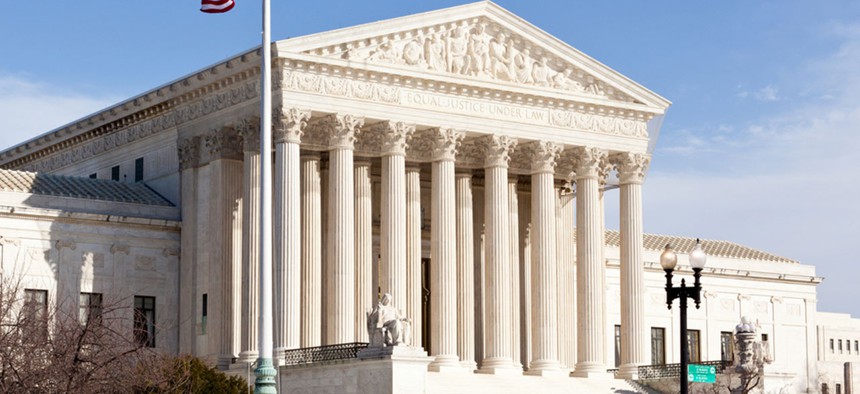
Steve Heap/Shutterstock.com
Obama’s Second-Term Agenda Hits a Roadblock: the Supreme Court
The president’s legacy has mostly survived legal challenges so far, but the shift toward executive action could change that.
The Supreme Court might not be as kind to President Obama’s second-term agenda as it was to his first.
The two signature initiatives of Obama’s second act—his executive actions on immigration and new regulations on power plants—are both on hold unless and until the Supreme Court says they can take effect. And in both cases, the Court has taken rare or unusual steps that signaled skepticism not only about Obama’s agenda, but also the assertions of executive power he has used to advance it.
The clearest signal yet came Tuesday evening, when the Court said the administration cannot implement Obama’s Clean Power Plan while legal challenges to the policy work their way through the courts—a freeze that will likely last into the next administration. Never before, an administration official said, has the high court blocked a regulation from taking effect before lower courts have ruled on its merits.
Similarly, the Court has never issued a straightforward ruling that said a president violated his constitutional duty to “take Care that the Laws be faithfully executed.” But when the Court agreed to rule on Obama’s immigration programs, it added a question—over the administration’s objections—about whether those policies violated the “take-care clause.”
The Court hasn’t ruled on the merits of either policy yet; the administration could still win both cases. But its orders in the energy and immigration cases, taken together, are discouraging signs for the Obama administration.
“These are only hints, but the hints are that a majority of the Court is skeptical,” said Orin Kerr, a law professor at George Washington University.
Obama’s first-term policy agenda—namely, Obamacare—held up pretty well at the Supreme Court. But the energy and immigration cases are different.
The 2012 lawsuit against Obamacare’s individual mandate was an argument that Congress had exceeded its authority by passing the mandate. And even when he’s ruled that Congress made a mistake, Chief Justice John Roberts has consistently been hesitant to constrain its underlying authority.
In his embrace of executive actions, though, Obama moved into riskier legal territory. And the high court’s conservative majority may be ready to draw the line.
Already, the Court has given Obama’s successor considerable power over his key second-term initiatives. If Obama is able to implement his immigration programs at all, it won’t be until the last six months of his administration—hardly enough time to get them fully in place. And there’s a good chance he won’t be able to see the Clean Power Plan through at all.
The Court’s 5-4 decision to temporarily block the Clean Power Plan was especially surprising to legal observers. It was the first time that the high court has agreed to block a regulation from taking effect before a lower court has ruled on its merits—and the lower court in this case has already agreed to speed up the proceedings.
Oral arguments in that court are scheduled for June 2. But even if it upholds Obama’s plan, the regulations still can’t take effect right away: The stay issued Tuesday lasts until the Supreme Court either rules on the merits of the plan or decides not to hear the issue.
The Clean Power Plan, unlike Obama’s immigration actions, was the product of formal regulations and a notice-and-comment period for the public. It’s not easy for a new administration to reverse its predecessors’ regulations, meaning the Clean Power Plan could have been hard for a Republican president to fully unwind. But if the program is still on ice when the next president takes office, a GOP administration could decide not to defend the policy in court.
(Image via Steve Heap/Shutterstock.com)






